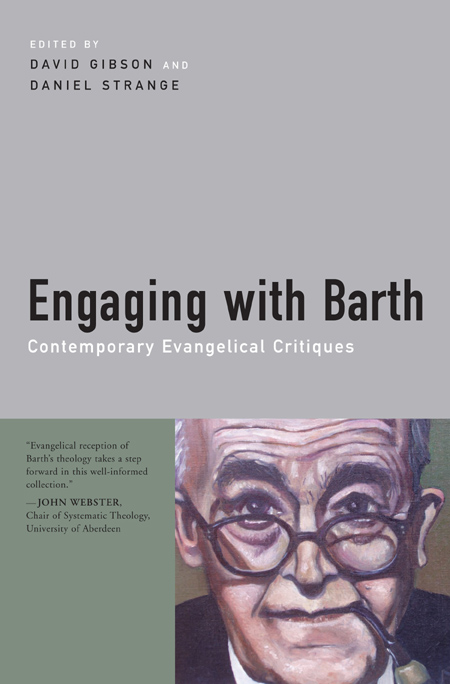A Brief Book Summary from Books At a Glance
By Steve West
About the Editors
David Gibson is Assistant Minister at High Church, Hilton, Aberdeen. Daniel Strange is Lecturer in Culture, Religion and Public Theology at Oak Hill Theological College, London.
Introduction
This book examines the legacy of Karl Barth, assessing it from an evangelical Reformed perspective. The contributors explore and critique various themes found in Barth. They aim to appreciate Barth’s positive contributions, while being critical of his formulations that are problematic. Most of Barth’s major theological emphases are examined, and conclusions are drawn in regard to what is and is not helpful in his thought.
Table of Contents
Introduction – David Gibson and Daniel Strange
Chapter 1 Karl Barth’s Christocentric Method – Henri Blocher
Chapter 2 Does it Matter if Christian Doctrine is Contradictory? Barth on Logic and Theology – Sebastian Rehnman
Chapter 3 Karl Barth as Historical Theologian: The Recovery of Reformed Theology in Barth’s Early Dogmatics – Ryan Glomsrud
Chapter 4 Karl Barth and Covenant Theology – A. T. B. McGowan
Chapter 5 The Day of God’s Mercy: Romans 9-11 in Barth’s Doctrine of Election – David Gibson
Chapter 6 Witness to the Word: on Barth’s Doctrine of Scripture – Mark D. Thompson
Chapter 7 A Private Love? Karl Barth and the Triune God – Michael J. Ovey
Chapter 8 Karl Barth and the Doctrine of the Atonement – Garry J. Williams
Chapter 9 Karl Barth and the Visibility of God – Paul Helm
Chapter 10 Karl Barth and Jonathan Edwards on Reprobation (and Hell) – Oliver D. Crisp
Chapter 11 ‘Church’ Dogmatics: Karl Barth as Ecclesial Theologian
Chapter 12 A Stony Jar: The Legacy of Karl Barth for Evangelical Theology – Michael S. Horton
Book Summary
Chapter 1: Karl Barth’s Christocentric Method
Christ is central to Barth’s theological method—Christology is not merely a topic in his system. It needs to be recognized that Barth can be very difficult to interpret. Barth can be paradoxical, but he does strive for logical coherence in a true system. He was dialectical throughout his career. Barth is not merely Christocentric: Christ is his principle of being and his principle of knowledge. All of his theology centered and concentrated on Christ. The incarnate Word is the focus. Christology is foundational to anthropology—Jesus is the original human, and we participate in humanity through him. Christ’s person and work are not separated: they are the Christ event. Every person is included in Christ, as Christ reconciles the world to God. Although Barth was careful never to affirm universalism explicitly, he didn’t deny it explicitly, and it seems an entailment of his thought. God’s election takes place in Christ. Creation and redemption are bound up with Christ, to the point where they cannot be separated. Part of Barth’s move to such a Christocentric method stemmed from his repudiation of natural theology. People are given Christ’s real righteousness; it is not merely imputed. The New Testament does not teach, however, that everyone is in Christ—being in Christ requires faith. Christ is the eternal Son, but his manhood was not eternal (Barth is in error at this point). The Bible speaks clearly of the Word in a preincarnate state. Creation precedes redemption in a stepwise fashion, but Barth erases this biblical distinction. God made the world good, but then came sin; after this, redemption. Barth’s doctrine of evil is insufficient. In the end his attempt to concentrate everything on Christ is too speculative.
Chapter 2: Does it Matter if Christian Doctrine is Contradictory? Barth on Logic and Theology
Christian creeds make statements that are intended as true, and thus they must not be logically contradictory. Barth argued that Christian truth should be defended against the charge of incoherence. However, he also maintained that some doctrines (e.g. the Trinity and Incarnation) can only be stated in ways that are contradictory to us; they are true but contradictory, so they are mysteries. Despite Barth, contradiction means that something cannot be true. Barth tried to avoid this by saying that the contradictions in theology are not insolvable. This is because God’s free actions are not subject to the law of non-contradiction. Since God is above the laws of logic, contradictory doctrines can be true of him, and since theses doctrines are represented in theology, some theological statements can be contradictory. Yet, against Barth, a sentence that is actually contradictory describes. . .
[To continue reading this summary, please see below....]The remainder of this article is premium content. Become a member to continue reading.
Already have an account? Sign In
Buy the books

Engaging with Barth: Contemporary Evangelical Critiques